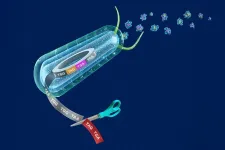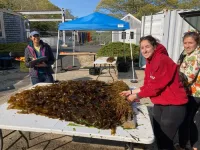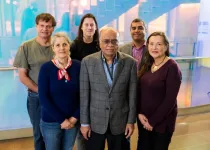(Press-News.org) New Haven, Conn. — Synthetic biologists from Yale were able to re-write the genetic code of an organism — a novel genomically recoded organism (GRO) with one stop codon — using a cellular platform that they developed enabling the production of new classes of synthetic proteins. These synthetic proteins, researchers say, offer the promise of innumerable medical and industrial applications that can benefit society and human health.
The creation of the landmark GRO, known as “Ochre” — which fully compresses redundant, or “degenerate” codons, into a single codon — is described in a new study published Feb. 5 in the journal Nature. A codon is a sequence of three nucleotides in DNA or RNA that codes for a specific amino acid, which serve as the biochemical building blocks for proteins.
“This research allows us to ask fundamental questions about the malleability of genetic codes,” said Farren Isaacs, professor of molecular, cellular and developmental biology at Yale School of Medicine and of biomedical engineering at Yale’s Faculty of Arts and Sciences, who is co-senior author of the paper. “It also demonstrates the ability to engineer the genetic code to endow multi-functionality into proteins and usher in a new era of programmable biotherapeutics and biomaterials.”
The landmark advance builds on a 2013 study by the team, published in Science, which described the construction of the first GRO. In that study, the researchers demonstrated new solutions for safeguarding genetically engineered organisms and for producing new classes of synthetic proteins and biomaterials with “unnatural,” or human-created, chemistries.
Ochre is a major step toward creating a non-redundant genetic code in E. coli, specifically, which is ideally suited to produce synthetic proteins containing multiple, different synthetic amino acids.
Jesse Rinehart, an associate professor of cellular and molecular physiology at the Yale School of Medicine and co-senior author on the study, called the breakthrough a “profound piece of whole genome engineering based on over 1,000 precise edits at a scale an order of magnitude greater than any engineering feat we have previously done.”
“This is an exciting new platform technology that opens up an array of applications for biotechnology both in the academic realm and in the commercial sector,” Rinehart said. “We want to advance our general knowledge of science but we also want to enable industrial applications that are beneficial to society.”
The codon, a sequence of three nucleotides in DNA or RNA, acts like an “instruction manual” for protein synthesis, telling the cell which of the 20 natural amino acids to add to a growing protein chain (or, in the case of “stop” codons, signaling the termination of protein synthesis). In this process, known as translation, the genetic information carried in a messenger RNA (mRNA), via the genetic code, dictates not only the order of amino acids but also when the process should start and stop.
Michael Grome, a postdoctoral associate in molecular, cellular, and developmental biology at Yale and first author of the study, likened codons to three-letter words within a sentence in the genetic recipe for life. Inside the cell, he said, there are ribosomes that act like 3-D printers that read the recipe. Each word calls for one “ingredient” amino acid from among the list of 20 natural amino acids that make up proteins.
“A lot of these words are equivalent, or synonymous,” Grome said. “We set out to add more ingredients for building proteins, so we took three of these words for ‘stop’ and made them one. Two words were removed, then we re-engineered the cell so they were ‘freed’ for new function. We then engineered a cell that recognized the word to say something new, to represent a new ingredient.”
Specifically, the researchers eliminated two of the three stop codons that terminate protein production. The recoded genome reassigned four codons to non-degenerate functions, including the two recoded stop codons dedicated to encoding nonstandard, or unnatural, amino acids into protein. In addition to introducing thousands of precise edits across the genome, the work required AI-guided design and re-engineering of essential protein and RNA translation factors to create a strain capable of adding two nonstandard amino acids into its recipe book. These nonstandard amino acids imbue proteins with multiple new properties, such as programmable biologics with reduced immunogenicity (a substance’s ability to induce an immune response in the body) or biomaterials with enhanced conductivity.
The results reflect years of recoding work by the two labs at the Yale Systems Biology Institute on West Campus. The collaboration between Rinehart and Isaacs dates to 2010 when they began working in neighboring labs. Isaacs has long been interested in engineering genomes — much like, he said, an architect might plan and make changes to a building. Rinehart’s work focuses on proteins — how they are made and how the stage might be set for them to carry out other actions.
“We recognized we have complementary expertise and that both labs bring a broad set of expertise and capability,” Rinehart said.
Isaacs is excited about what he describes as the potentially “killer” applications for programmable protein biologics that the new platform will make possible. One such application involves engineering protein drugs with synthetic chemistries to decrease the frequency of dosing or undesirable immune responses. The team reported such an application using their first-generation GRO in a 2022 study. In that study they encoded non-standard amino acids into protein, demonstrating a safer, controllable approach to precisely tune the half-life of protein biologics.
The new Ochre cell expands these capabilities for use in the construction of multi-functional biologics. Isaacs and Rinehart are currently acting as advisors to Pear Bio, a Yale biotechnology spin-off that has licensed the technology for commercializing programmable biologics.
Other Yale researchers involved in the study are Michael Nguyen, Daniel Moonan, Kyle Mohler, Kebron Gurara, Shenqi Wang, Colin Hemez, Benjamin Stenton, Yunteng Cao, Felix Radford, Maya Kornaj, Jaymin Patel, Maisha Prome, Svetlana Rogulina, David Sozanski, and Jesse Tordoff.
END
Yale scientists recode the genome for programmable synthetic proteins
2025-02-10
ELSE PRESS RELEASES FROM THIS DATE:
MiR-128-3p mediates MRP2 internalization in estrogen-induced cholestasis through targeting PDZK1
2025-02-10
https://www.scienceopen.com/hosted-document?doi=10.15212/AMM-2024-0053
Announcing a new publication for Acta Materia Medica journal. Estrogens have been reported to cause dysfunction in biliary transport systems, thereby inducing cholestasis. Multidrug resistance-associated protein 2 (MRP2) is a transporter responsible for independent bile flow. Emerging evidence indicates that PDZ domain containing 1 (PDZK1) regulates localization of MRP2; however, PDZK1’s role and regulatory machinery in MRP2-mediated estrogen-induced cholestasis (EIC) remain unclear.
The authors of this article observed, in a mouse model of EIC, downregulated PDZK1 expression in the liver and enhanced intracellular ...
Bleeding risk with apixaban and dabigatran similar to aspirin
2025-02-10
Embargoed for release until 5:00 p.m. ET on Monday 10 February 2025
@Annalsofim
Below please find summaries of new articles that will be published in the next issue of Annals of Internal Medicine. The summaries are not intended to substitute for the full articles as a source of information. This information is under strict embargo and by taking it into possession, media representatives are committing to the terms of the embargo not only on their own behalf, but also on behalf of the organization they represent.
----------------------------
1. ...
MD Anderson Research Highlights for February 10, 2025
2025-02-10
HOUSTON ― The University of Texas MD Anderson Cancer Center’s Research Highlights showcases the latest breakthroughs in cancer care, research and prevention. These advances are made possible through seamless collaboration between MD Anderson’s world-leading clinicians and scientists, bringing discoveries from the lab to the clinic and back. This issue includes studies to be presented this week at the 2025 American Society of Clinical Oncology (ASCO) Genitourinary Cancers Symposium.
Metastasis-directed therapy shows favorable ...
Ready (or not) for love? Your friends likely agree
2025-02-10
MSU has a satellite uplink/LTN TV studio and Comrex line for radio interviews upon request.
EAST LANSING, Mich. – Feeling ready for a committed relationship is a key step in dating. But do your friends agree that you’re ready for a long-term relationship? As this week is Valentine’s Day, newer couples may be considering just how serious their relationship is together.
A new study from Michigan State University found that friends significantly agreed on who was ready for committed relationships — and who wasn’t.
The ...
Health care students and clinicians support integrated care education
2025-02-10
Integrated care – a coordinated approach that addresses patients’ physical, mental and social health needs – has been shown to improve patient outcomes, reduce health care costs and address health disparities.
Since 2019, the Rutgers University Behavioral Health Care’s Center for Integrated Care has served as a hub for integrated care education and training at Rutgers Health while providing clinical services with partners throughout New Jersey.
Researchers at the center have published ...
Scientists from the Woods Hole Oceanographic Institution identify heat-resistant kelp strain
2025-02-10
Like most aquatic vegetation, kelp is being negatively impacted by climate change. Warming ocean temperatures have led to shorter growing and harvesting seasons, including for sugar kelp, one of the most commonly farmed kelp species. The loss of kelp populations can significantly impact ecosystems, and potentially the growing demand for sustainably farming food, feed, fertilizer, medicine, and cosmetics.
To give kelp a chance against climate change, scientists from the Woods Hole Oceanographic Institution (WHOI) have identified kelp species with natural adaptations to cope with heat. In a new study published in the Journal of Applied Phycology[RM1] , WHOI experts identify new strains ...
Rice-BCM research enables detection of hazardous chemicals in human placenta with unprecedented speed and precision
2025-02-10
HOUSTON – (Feb. 10, 2025) – Rice University scientists and collaborators at Baylor College of Medicine (BCM) have demonstrated a new method for detecting the presence of dangerous chemicals from tobacco smoke in human placenta with unprecedented speed and precision.
The research team used a combination of light-based imaging techniques and machine learning (ML) algorithms to identify and label polycyclic aromatic hydrocarbons (PAHs) and their derivatives (PACs) ⎯ toxic compounds generated through the incomplete combustion ...
Researchers are driving the charge of zero emissions
2025-02-10
No exhaust means no emissions, right?
Not quite.
It is commonly known that while electric vehicles do not produce tailpipe greenhouse gas emissions while driving, they do create debris from tire and brake abrasion. However, the degree to which they do and how that compares to internal combustion engine vehicles was largely unknown until the Virginia Tech Transportation Institute's Hesham Rakha investigated it.
In an article published in Transportation Research Part D: Transport and Environment, Rakha, alongside institute research associate Mohamed Farag and Associate Professor of civil and environmental engineering Hosein Foroutan, reported findings ...
USC-led study finds potential new drug target for Alzheimer’s disease
2025-02-10
A team of researchers from the Keck School of Medicine of USC has unlocked the details of a cellular pathway that triggers cellular inflammation and aging and is linked to Alzheimer’s disease, particularly among those who carry the APOE4 genetic risk. They have also found a way to return cells to a healthy state, revealing a new potential approach to treatment. The study, the culmination of a decade of research on a protein known as ATP-binding cassette transporter A1 (ABCA1), was just published in the journal Molecular Neurodegeneration.
Past research ...
Why you need to subscribe to NFCR’s new podcast, “All Things Cancer”
2025-02-10
Kick-Off Episode with Dr. Margaret Foti, CEO of AACR, Premieres February 11
Bethesda, MD – February 7, 2025 – The National Foundation for Cancer Research (NFCR) is excited to announce the official launch of its groundbreaking new podcast, All Things Cancer, premiering on February 11, 2025. Hosted by NFCR CEO, Sujuan Ba, Ph.D., this compelling series will bring together the entire ecosystem of cancer research—including leading scientists, oncologists, doctors, patient advocates, caregivers, biotech innovators, and survivors—for powerful discussions on the breakthroughs shaping the future of cancer research, treatment, and ...



